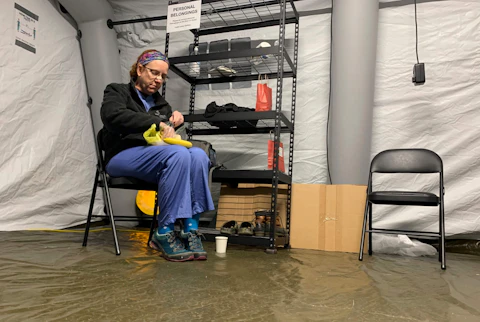Labs taking a week or more to give COVID-19 test results, harming NC’s efforts to slow disease’s spread.
People are waiting days to get their results from COVID-19 tests in North Carolina, delays that public health experts say undermine efforts to suppress the virus’ spread.
In some cases, commercial labs in North Carolina are taking as long as 6 to 7 days to turn around test results, NC Department of Health and Human Services Secretary Mandy Cohen said last week.
“We continue to be concerned about testing capacity and lab testing times,” she said in a briefing.
Those delays come as the public, hospital, and commercial labs deal with an onslaught of testing demand and with rolling shortages in the chemical reagents needed to process the COVID-19 tests.
Delays in getting tests results increases the time in which a carrier can unknowingly spread the disease to others. The state has seen a steady escalation in new COVID-19 cases, with 1,552 deaths from the disease, according to data released by NC DHHS on Tuesday. Hospitalizations are also at their highest rate yet, with 1,109 COVID-19 patients sick enough to need inpatient care.
“We’ve seen how quickly this virus has jumped in other states,” Gov. Roy Cooper said at a media briefing last week. “We don’t want that here.”
RELATED: COVID Cases Are Spiking in NC. What is Trump Doing About It?
In Catawba County, for example, a recent family gathering where no one wore masks sparked a fairly significant outbreak. Fourteen family members left the party with the virus, and within 16 days, it had sickened 41 people in nine different families and eight workplaces.
On top of the backlog, North Carolinians aren’t taking enough tests. The state was among 34 states analyzed by the Covid Tracking Project that fell far below testing targets to mitigate the virus’ spread.
Cohen and others at NC DHHS have asked health officials in the Trump Administration for help, and have relayed how roadblocks to testing are undercutting efforts to control COVID-19 spread.
Problem from beginning
Testing was a major problem at the start of the pandemic in early spring, with the nation’s leading public health agency, the Centers for Disease Control and Prevention, failing to quickly send states promised tests. That, in addition to other testing shortages, meant health providers had to ration them.
Public health officials, as a result, had little sense of how much of COVID-19 was circulating in the population, one of several reasons why much of the country shut down schools and non-essential retail businesses.
Since then, the number of tests have significantly increased as academic hospitals, commercial labs and others quickly created tests for the new virus and brought their own labs online.
Currently, anyone who needs a test is supposed to be able to get one, and often at no costs. Those looking to be tested can look for a testing site here through NC DHHS.
But the lack of a national strategy on testing has left states and local health care systems to figure out approaches on the fly, said Melissa Miller, the director of clinical molecular biology for UNC Health. Miller has been coordinating efforts to develop and deploy tests for COVID-19 at UNC Health, an 11-hospital system anchored out of the state’s flagship university in Chapel Hill.
One of the biggest challenges has been a tight supply chain that’s made it hard to get enough laboratory pipettes or chemical reagents needed to run COVID-19 tests.
‘This is not normal’
At UNC Health, for example, their labs use up to four types of COVID-19 tests so that they can pivot when there’s a shortage in chemical reagents, for example, without delaying needed COVID-19 results in the hospital.
“This is not normal,” Miller said. “Our hope is that if we learn anything from this pandemic it will be not to repeat this again.”
UNC Health has largely been able to turn around results quickly for patients coming into the system’s hospitals. Critical patients coming to emergency rooms may be given rapid tests that show results in an hour, while overall, the hospital system labs show results of other tests in 11 hours.
That’s much faster than in the commercial labs serving a large chunk of the state’s medical practices and drive-up testing sites.
Until recent weeks, LabCorp, the global life sciences testing company headquartered in Burlington, had been tuning around COVID-19 diagnostic tests for Walgreens and other partners in one to two days. Now, it’s looking at a 4 to 6 day window to deliver results.
And another major testing company, Quest, released a statement Monday that said the surge in cases nationally has led to an average wait of 7 days for test results, much longer than the one-day turnaround company officials had aimed for.
“We want patients and healthcare providers to know that we will not be in a position to reduce our turnaround times as long as cases of COVID-19 continue to increase dramatically across much of the United States,” the read. “This is not just a Quest issue.”
Faster results needed to slow COVID
Both Cohen and Gov. Roy Cooper relayed last week that they’re very concerned about the logjams in the testing process at commercial labs. Accurate and timely testing allows public health workers and epidemiologists to gauge how present the virus is in the general population.
“When we test and identify infections promptly, we get the information we need to slow the spread of the disease,” Cohen said.
The state lab run by the NC Department of Public Health hasn’t seen significant delays but the commercial lab delays are concerning, Cohen said.
In the meantime, she said, people should be adhering to other guidance around decreasing COVID-19 spread: staying home if feeling unwell, wearing masks and staying six feet away from others.





